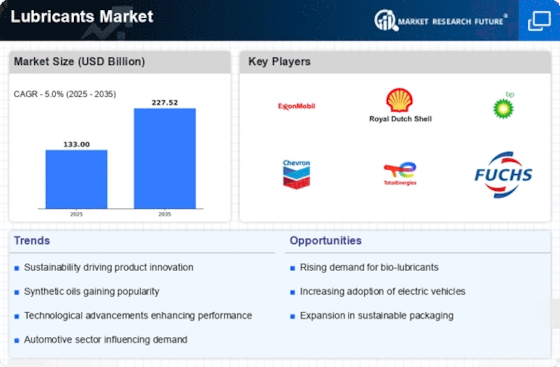Top Industry Leaders in the Lubricants Market

The lubricants market is a complex and dynamic arena where global giants and niche players jostle for dominance. Understanding the competitive landscape is crucial for navigating this ever-evolving terrain. Let's delve into the strategies adopted, factors influencing market share, industry news, and recent developments shaping the future of this vital sector.
Strategies Adopted by Lubricants Giants:
-
Brand Strength and Innovation: Major players like Exxon Mobil, Shell, and Chevron leverage their established brand names and invest heavily in R&D to develop cutting-edge lubricants catering to specific industry needs. This includes advancements in synthetic formulations, bio-based lubricants, and greases for extreme environments. -
Partnerships and Acquisitions: Strategic partnerships with automakers and industrial equipment manufacturers provide direct access to customers and market insights. Acquisitions, like BP's purchase of Castrol India, expand reach and bolster market share in high-growth regions. -
Diversification and Specialization: Diversification into adjacent markets like metalworking fluids and coolants mitigates risk and opens new revenue streams. Specialization in niche segments, like food-grade lubricants or high-performance racing oils, creates competitive advantage. -
Sustainability and Environmental Focus: Growing consumer consciousness drives the development of eco-friendly lubricants with reduced environmental impact. Investments in renewable raw materials and responsible waste disposal practices are becoming key differentiators.
Factors Influencing Market Share:
-
Economic Growth: A strong global economy, particularly in developing regions like China and India, fuels demand for vehicles and industrial machinery, leading to increased lubricant consumption. -
Technological Advancements: Innovations in engine and machinery technology necessitate lubricants with higher performance and efficiency standards, creating opportunities for specialized product development. -
Government Regulations: Stringent environmental regulations on lubricant composition and disposal influence market dynamics. This favors companies with eco-friendly offerings and efficient waste management practices. -
Fluctuating Oil Prices: Crude oil, a key raw material for lubricants, is subject to price volatility. Companies with diverse sourcing strategies and risk-mitigation plans are better positioned to navigate these fluctuations.
Key Companies in the Lubricants market includes
-
Royal Dutch Shell PLC.
-
Exxonmobil Corporation
-
Chevron Corporation
-
TotalEnergies
-
Sinopec Lubricant Company
-
Petrochina Company Limited
-
BP PLC
-
JXTG Group
-
Idemitsu Kosan Co. Ltd
-
FUCHS among others
Recent Developments:
Aug 2023: ExxonMobil announces a partnership with Siemens Energy to develop lubricants specifically for wind turbine applications, aligning with the growing renewable energy sector.
Nov 2023: TotalEnergies acquires a specialty lubricants manufacturer, expanding its presence in the industrial lubricants segment.
Dec 2023: Reports emerge of a potential acquisition bid by Chevron for a leading synthetic lubricants producer, signifying the growing importance of high-performance lubricants in the market.










